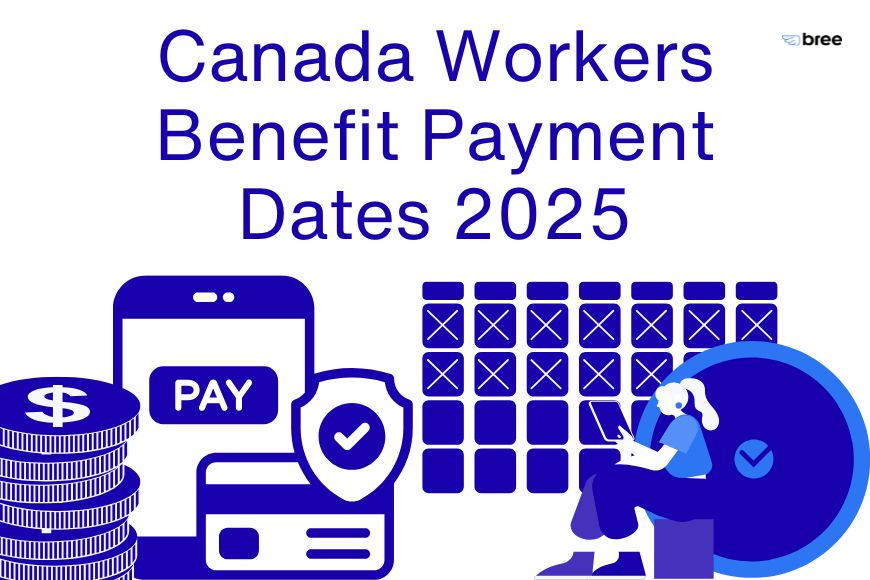Rising costs continue to challenge hardworking Canadians across the country. With inflation still impacting everything from groceries to rent, many people are struggling to make ends meet despite working full-time jobs. The good news? The Canada Workers Benefit (CWB) is here to help ease that financial pressure for low-income workers and their families.
The Canada Workers Benefit (CWB) is a refundable tax credit designed specifically for low-income Canadians who are working. It's the government's way of recognizing your hard work and helping you get ahead. The workers' benefits have two parts: a basic amount and a disability supplement, both designed to put more money back in your pocket when you need it most.
Key Takeaways:
- Current maximum benefits: Singles can get up to $1,590, families up to $2,739
- Canada workers' benefit payment dates are set: July 12, October 12, and January 12 each year
- Automatic quarterly payments: No separate application needed if you file your tax return
- Broader eligibility: More Canadians qualify due to increased income thresholds
- Quick access: Get up to 50% of your benefit through the Advanced Canada Workers Benefit (ACWB)

How Much Can You Receive from the Canada Workers Benefit (CWB)?

The Canada workers' benefit payment amount depends on several key factors:
- Your working income
- Your marital status
- Number of dependents
- Your adjusted family net income or adjusted net income
- Your province or territory of residence
Important note: Quebec, Nunavut, and Alberta have different maximum benefit amounts than other provinces and territories. Always verify the specifics based on your province of residence.
Basic Benefit Amounts
For single individuals:
- Maximum: $1,590 annually
- Phase-out begins: When your adjusted net income exceeds $26,149
- CWB benefit ends: At adjusted net income of $36,749
For families:
- Maximum: $2,739 annually
- Phase-out begins: When your adjusted family net income exceeds $29,833
- Benefit ends: At adjusted family net income of $48,093
Disability Supplement Amounts
The disability supplement provides additional support for those eligible for the disability tax credit:
For both singles and families:
- Maximum disability supplement: $821 annually
Single individuals:
- Phase-out begins: At adjusted net income over $36,748
- Disability supplement eligibility ends: At adjusted net income over $42,222
Families:
- Phase-out begins: At adjusted family net income over $48,091
- Benefit ends: At adjusted family net income over $53,565 (one spouse eligible) or $59,038 (both spouses eligible)
Eligibility Requirements for the Canada Workers Benefit
To qualify for the Canada Workers Benefit ACWB program, you must meet these requirements:
Income requirements:
- Earn at least $3,000 from working income (employment or self-employment)
- Have adjusted net income below the threshold for your province or territory
Age and residency requirements:
- Be 19 or older on December 31 of the current year, OR be living with your spouse, common law partner, or child
- Be a resident of Canada throughout the year
You're NOT eligible if:
- You were enrolled as a full-time student for more than 13 weeks (unless you had an eligible dependent)
- You were in prison or a similar institution for 90 days or more during the year
- You're tax-exempt as a foreign diplomat or family member/employee of such a person
How to Apply for the Advanced Canada Workers Benefit
Getting your workers' benefit payment is straightforward – you just need to file your tax return with the Canada Revenue Agency. Here's what to do:
If using tax software: Fill out Schedule 6 (Canada Workers Benefit) when filing your taxes. Most tax software will guide you through determining eligibility and entering necessary information.
If filing a paper tax return: Complete the Schedule 6 form and submit it with your return.
Advanced Canada Workers payments: The Advanced Canada Workers Benefit is automatically enabled when you file your tax return. You'll receive up to 50% of your workers' benefit spread across three payment dates throughout the year.

Canada Workers Benefit Payment Dates 2025
Mark your calendar for these benefit payment dates:
- July 12, 2025
- October 12, 2025
- January 12, 2026
Payment schedule note: When a payment date falls on a weekend or federal statutory holiday, payments are received on the last business day before the scheduled date.
Future years: These same payment dates (July 12, October 12, January 12) will continue for future benefit periods, making it easy to plan your finances around these quarterly boosts.
Looking ahead: The government has announced that benefit amounts will increase for the 2025 tax year (which you'll receive starting in 2026). Singles may receive up to $1,633 and families up to $2,813, with the disability supplement increasing to $843. These enhanced amounts will be based on your 2025 tax return.
If you don't receive federal benefits on the expected date, wait 10 working days before contacting the Canada Revenue Agency. Set up direct deposit to ensure you receive payments quickly and securely.
Additional Federal Benefits for Low-Income Canadians
If you qualify for the Canada Workers Benefit, you might also be eligible for these other federal benefits:
Canada Child Benefit (CCB)
The Canada Child Benefit (CCB) provides tax-free monthly payments for families raising children under 18. For 2025-2026, maximum annual amounts are $7,997 for children under 6 and $6,748 for children aged 6-17. This benefit significantly helps with dental costs and other expenses of raising children. Visit this site to review the eligibility requirements for this benefit.
GST HST Credit
Quarterly payment amounts help recover some of the sales tax you've paid. For 2025-2026, singles can receive up to $533 annually, while couples can get up to $698, plus additional amounts for children.
Provincial Tax Credits
Depending on your province, you may qualify for additional territorial programs:
- Ontario Trillium Benefit (OTB): Combines the Ontario energy and property tax credit, Northern Ontario energy credit, and Ontario sales tax credit
- Alberta child and family benefit: Provides additional support for Alberta families
- Family benefit ACFB: Available in some provinces for families with children
Other Benefits for Canadian Seniors
- Guaranteed income supplement: Additional support for low-income seniors receiving Canada Pension Plan benefits
- Old age security: Monthly payments for Canadians 65 and older
Can I Get a Cash Advance While Receiving Workers' Benefits?

The Canada Workers' Benefit is considered income when lenders review your application, which can help you qualify for financial products. However, traditional lenders will still examine other factors like your credit score, debt-to-income ratio, and employment status.
Before considering any loan:
- Create a realistic budget to avoid overextending yourself
- Look for ways to increase your family income rather than taking on debt
- Consider alternatives to traditional payday lenders, which often charge extremely high interest rates
Bree's approach: At Bree, we understand that unexpected expenses don't wait for payday. That's why we offer interest-free cash advances up to $750 to help you bridge financial gaps without the burden of high-interest debt. Our community-focused approach means we're here to help you move toward financial wellness, not trap you in debt cycles like traditional payday lenders.
Important Notes About Tax Affairs and Benefits
When managing your tax affairs, remember these key points:
- File your tax return on time to ensure you receive all the benefits you're entitled to
- Keep your information updated with the Canada Revenue Agency to avoid delays in benefit payments
- Consider setting up direct deposit for faster access to all federal benefits
- If you move provinces, notify the government of Canada about your address change, as payment amounts may vary
Future benefit considerations: The government continues to evaluate and adjust these programs to help low-income workers. Stay informed about changes that might affect your eligibility or payment amounts in future benefit periods.
Frequently Asked Questions
Can I receive the Canada Workers Benefit if I'm self-employed?
Yes! Self-employment income counts as working income for the Canada Workers Benefit, as long as you earn at least $3,000 annually. You'll need to report your net self-employment income when filing your taxes with Schedule 6.
What happens if I don't file my taxes on time?
You can still claim the Canada Workers Benefit by filing your tax return late, but you won't receive the Advanced Canada Workers Benefit (ACWB) payments for that year. You'll get your full benefit amount when your return is processed, but you'll miss out on the quarterly advance payments.
Can I get both the Canada Workers Benefit and Employment Insurance (EI)?
Yes, you can receive both benefits simultaneously. Employment Insurance payments don't disqualify you from the Canada Workers Benefit, as long as you meet the working income and other eligibility requirements. However, EI payments may affect your adjusted net income calculation.
Moving Forward with Financial Confidence
The Canada Workers Benefit recognizes your hard work and helps you get ahead financially. Combined with other government benefits and smart financial choices, it can be an important part of building financial stability despite rising costs.
Ready to take control of your finances? Whether you're managing between paydays or building toward bigger financial goals, Bree is here to support Canadian workers with fair, interest-free financial solutions. Join thousands of Canadians who've chosen a better way to handle their money – explore how Bree can help you avoid expensive payday loans and move toward financial wellness with confidence.

Join our newsletter to get the latest updates






